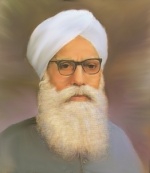Template:AOW315: Difference between revisions
Hari singh (talk | contribs) (Created page with '{{aowh2|Professor Sahib Singh|Professor Sahib Singh|Barsi October 29}} {{pm|File:Prof Sahib Singh-m1.jpg|'''Professor Sahib Singh'''}} '''Professor Sahib Singh''' ([[16 …') |
Hari singh (talk | contribs) No edit summary |
||
| Line 2: | Line 2: | ||
{{pm|File:Prof Sahib Singh-m1.jpg|'''[[Professor Sahib Singh]]'''}} | {{pm|File:Prof Sahib Singh-m1.jpg|'''[[Professor Sahib Singh]]'''}} | ||
'''[[Professor Sahib Singh]]''' ([[16 February]], [[1892]]- | '''[[Professor Sahib Singh]]''' ([[16 February]], [[1892]] - [[29 October]] [[1977]]) was a renowned [[Sikh]] academic who made a tremendous contribution to Sikh literature. He was an exceptional grammarian, author, scholar and theologian born in a [[Hindu]] family in the village of Phattevali in [[Sialkot]] district of undivided [[Punjab]]. He was named Natthu Ram by his father, Hiranand, who kept a small shop in the village. Soon the family shifted to Tharpal, another nearby village in the same district. | ||
As a youth, Natthu | As a youth, Natthu Ram was apprenticed to the village Maulawi (Muslim teacher), Hayat Shah, son of the famous Punjabi poet, Hasham, upon whom his royal patron, [[Maharaja Ranjit Singh|Ranjit Singh]], the [[Maharaja]] of the [[Punjab]], had settled a permanent jagir. | ||
The untimely death of his father made the situation hard for him, yet he managed to plough through first Dyal | Winning a scholarship at his middle standard examination, Natthu Ram joined the high school at Pasrur. It was here that he decided to become a Sikh and received in 1906 the rites of the [[Khalsa]]. Upon joining the [[Khalsa]] panth, his new name was Sahib Singh. | ||
The untimely death of his father made the situation hard for him, yet he managed to plough through first Dyal Singh College, [[Lahore]], and then the Government College, Lahore. <!---At the latter, he obtained his bachelor's degree. In 1917, he joined as a lecturer in [[Sanskrit]] at Guru Nanak Khalsa College, Gujranwala.---> {{aowf|Professor Sahib Singh}} | |||
Revision as of 18:24, 27 October 2009
Professor Sahib Singh (16 February, 1892 - 29 October 1977) was a renowned Sikh academic who made a tremendous contribution to Sikh literature. He was an exceptional grammarian, author, scholar and theologian born in a Hindu family in the village of Phattevali in Sialkot district of undivided Punjab. He was named Natthu Ram by his father, Hiranand, who kept a small shop in the village. Soon the family shifted to Tharpal, another nearby village in the same district.
As a youth, Natthu Ram was apprenticed to the village Maulawi (Muslim teacher), Hayat Shah, son of the famous Punjabi poet, Hasham, upon whom his royal patron, Ranjit Singh, the Maharaja of the Punjab, had settled a permanent jagir.
Winning a scholarship at his middle standard examination, Natthu Ram joined the high school at Pasrur. It was here that he decided to become a Sikh and received in 1906 the rites of the Khalsa. Upon joining the Khalsa panth, his new name was Sahib Singh.
The untimely death of his father made the situation hard for him, yet he managed to plough through first Dyal Singh College, Lahore, and then the Government College, Lahore. .....More

